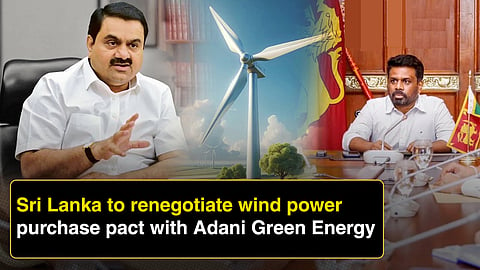What’s Behind the Move?
In a significant development, the Sri Lankan government has announced plans to renegotiate its power deal with Adani Green Energy, a subsidiary of India’s Adani Group. The deal, which involves the construction of a 500 MW wind power project in the island nation’s northern region, has come under scrutiny amid concerns over pricing, transparency, and geopolitical implications.
This move marks a critical moment in Sri Lanka’s energy sector and its relationship with one of India’s largest conglomerates. But what led to this decision, and what does it mean for Sri Lanka’s energy future? Let’s dive in.
The Adani Power Deal: A Quick Recap
In 2022, the Adani Group signed a deal with the Sri Lankan government to develop a $500 million wind power project in Mannar and Pooneryn. The project aimed to boost Sri Lanka’s renewable energy capacity and reduce its reliance on fossil fuels. However, the deal faced criticism from the outset, with opponents raising questions about:
- Pricing: Concerns that the agreed tariff rates were higher than global standards.
- Transparency: Allegations of a lack of competitive bidding and proper oversight.
- Geopolitics: The deal was seen by some as a reflection of India’s growing influence in Sri Lanka, sparking debates about sovereignty.
Why the Renegotiation?
The decision to renegotiate the deal comes amid mounting pressure from various stakeholders, including opposition parties, civil society groups, and energy experts. Here are the key reasons behind the move:
- Economic Challenges: Sri Lanka is still recovering from its worst economic crisis in decades. Renegotiating the deal could help secure more favorable terms and reduce financial strain.
- Public Backlash: Critics argue that the deal was rushed and lacked transparency, leading to public distrust.
- Global Energy Trends: With renewable energy costs declining globally, Sri Lanka aims to align the deal with current market rates.
- Geopolitical Balancing: The government may be seeking to address concerns about over-reliance on Indian investments while maintaining strong bilateral ties.
What’s on the Table?
The renegotiation is expected to focus on:
- Tariff Rates: Securing lower rates to make the project more cost-effective for Sri Lanka.
- Project Scope: Potentially revising the scale or location of the project to address environmental and social concerns.
- Local Involvement: Ensuring greater participation of Sri Lankan companies and workers in the project.
Challenges Ahead
Renegotiating a deal of this scale is no small task. Key challenges include:
- Maintaining Investor Confidence: The Adani Group is a major player in the global energy sector. Sri Lanka will need to balance its demands with the need to attract foreign investment.
- Timely Implementation: Delays in finalizing the deal could slow down Sri Lanka’s transition to renewable energy.
- Geopolitical Sensitivity: The renegotiation could have implications for India-Sri Lanka relations, which are crucial for regional stability.
What Does This Mean for Sri Lanka?
For Sri Lanka, the renegotiation represents an opportunity to:
- Secure Better Terms: Ensure the project aligns with the country’s economic and energy goals.
- Boost Transparency: Restore public trust in large-scale infrastructure projects.
- Strengthen Energy Security: Accelerate the shift to renewable energy and reduce dependence on costly fossil fuel imports.
The Bigger Picture
The Adani power deal renegotiation is part of a broader trend in which developing countries are reassessing large infrastructure projects to ensure they deliver maximum benefits. It also highlights the growing importance of renewable energy in addressing climate change and energy security.
For Sri Lanka, this move could set a precedent for future deals, emphasizing the need for transparency, fairness, and sustainability.
What’s Next?
The Sri Lankan government is expected to engage in detailed discussions with the Adani Group in the coming months. The outcome of these talks will be closely watched by investors, policymakers, and citizens alike.
A Turning Point for Sri Lanka’s Energy Future
The decision to renegotiate the Adani power deal is a bold step towards ensuring that Sri Lanka’s energy projects are both economically viable and socially responsible. While challenges remain, the move underscores the country’s commitment to securing a sustainable and equitable energy future.
As the talks progress, one thing is clear: the stakes are high, and the world is watching.
What are your thoughts on Sri Lanka’s decision to renegotiate the Adani power deal? Do you think it’s a step in the right direction? Share your views in the comments below!
